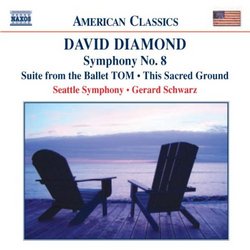| All Artists: Erich Parce, David [6] Diamond, Gerard Schwarz, Seattle Symphony Orchestra Title: David Diamond: Symphony No. 8; Suite from the Ballet TOM; This Sacred Ground Members Wishing: 0 Total Copies: 0 Label: Naxos American Release Date: 5/18/2004 Genre: Classical Styles: Opera & Classical Vocal, Symphonies Number of Discs: 1 SwapaCD Credits: 1 UPC: 636943915622 |
Search - Erich Parce, David [6] Diamond, Gerard Schwarz :: David Diamond: Symphony No. 8; Suite from the Ballet TOM; This Sacred Ground
 | Erich Parce, David [6] Diamond, Gerard Schwarz David Diamond: Symphony No. 8; Suite from the Ballet TOM; This Sacred Ground Genre: Classical
|
Larger Image |
CD Details |
CD ReviewsThe Fine Diamond Orchestral Series Continues J Scott Morrison | Middlebury VT, USA | 10/16/2004 (5 out of 5 stars) "David Diamond (b. 1915, and still with us) has been one of American's finest composers since between the two world wars. In the late 1980s and early 1990s the Delos label issued a series of fine recordings of his orchestral music with the Seattle Symphony conducted by Gerard Schwarz. Naxos has been re-releasing them at budget price (although I notice that the Delos version of this release is still available here at Amazon at mid-price). For some reason each individual Naxos release has typically had slightly different contents from its Delos predecessor, but this one exactly reproduces its Delos source. And a nice one it is, too.
'TOM' was intended to be a ballet based on 'Uncle Tom's Cabin,' set to a scenario by E. E. Cummings as requested by American ballet impresario Lincoln Kirstein. But obstacles arose and the ballet was never produced. Here we have a 23-minute, 12-movement suite fashioned from the full ballet score by the composer a couple of years later, in 1937. The music was written when Diamond was only twenty and still a student of Roger Sessions. One can hear some of Sessions's granitic style, but it is leavened by folk-rhythms and -melodies. One can almost hear Diamond developing his mature style with both its etched neoclassic and seductively romantic qualities as the music proceeds. An exemplar of the former is the Stravinskyan 'Dance of the Slavetraders and Human Bloodhounds,' and of the latter is the following 'Dance of Thankfulness for Freedom.' In 1963 conductor Josef Krips asked Diamond to compose a choral setting of Lincoln's 'Gettysburg Address.' It was premièred late that year by Lukas Foss conducting Krips's Buffalo Symphony Orchestra. It is set for chorus, children's chorus, baritone solo and orchestra and this recording features not only the Seattle Symphony but also the Seattle Symphony Chorus, the Seattle Girls' Choir, the Northwest Boychoir, and baritone Erich Parce. The text is printed in the CD's accompanying booklet. Solemn, tonal/modal, straightforwardly patriotic, it sounds as if it might have been written twenty years earlier during World War II. Deeply heart-felt, it wears it earnestness on its sleeve and one wonders how it was greeted at its première in the turbulent 1960s. As is always the case with this sort of piece, how it is heard is at least partly determined by the tenor of the times in which it is performed. In these days of another war, it is, for me, difficult to avoid thinking of young men (and women) who have also found their 'final resting place,' and hoping it has been for some lasting purpose as it clearly was for those who fell in our Civil War. Diamond's 30-minute, two-movement Eighth Symphony was written in 1960 to honor of his long-time friend, Aaron Copland, on his sixtieth birthday. Written in mostly tonal but highly chromatic style, it makes more than occasional use of Bergian post-tonality albeit in non-aggressive fashion. The first movement begins rather harshly with a tone-row pounded out by the full orchestra. A more lyrical second theme becomes increasingly important and through various manipulations of both motifs the movement winds its way to a vigorous Schumanesque (Bill, not Robert) brass/percussion peroration that then ends with a diffident upward questioning gesture. The second movement is an adagio Theme and Variations (seven of them) ending in a grand double fugue whose theme is derived from the first theme of the first movement. This is not one of Diamond's more lyrical symphonies. It was written at a time when American composers were facing the atonal imperative--indeed, his friend Copland had just written his twelve-tone 'Connotations' for orchestra--but the ever-present Romantic nature of Diamond's music keeps winning through. So, although this is perhaps the toughest of Diamond's symphonies and to some degree uncharacteristic of his overall style, one still hears the rhythmic, harmonic and structural qualities that are so identifiably Diamondesque. Schwarz and his Seattle forces perform admirably throughout. TT=68:54 Scott Morrison" |

 Track Listings (15) - Disc #1
Track Listings (15) - Disc #1